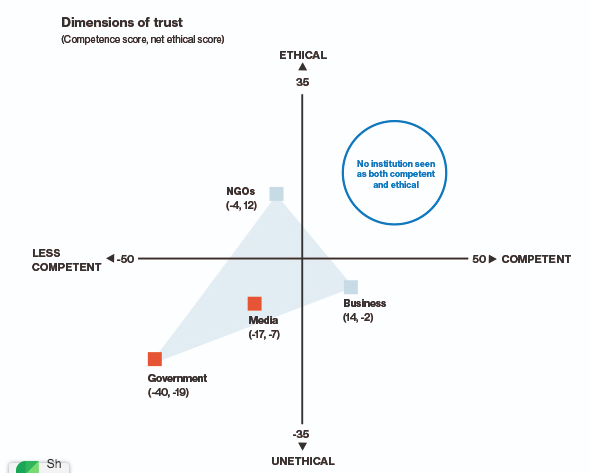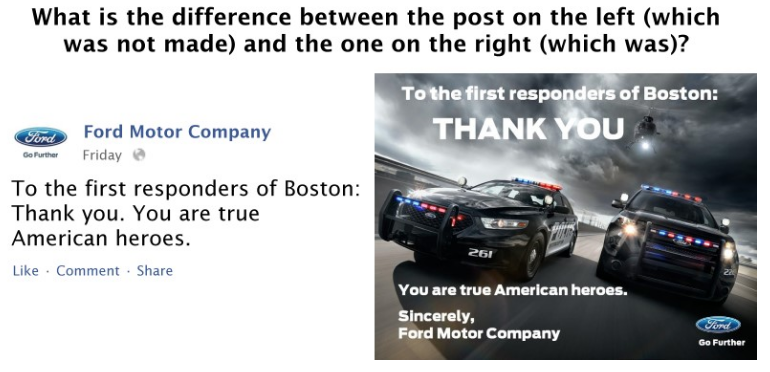Reading: New Challenges in Marketing Ethics
New marketing channels create opportunities for new tactics, but sometimes these developments bring new ethical challenges. Eventually, society may establish what is acceptable behaviour and what is not, but that process takes time. The 2020 Edelman Trust Barometer Study[1] found that customers increasingly expect brands to “place customers ahead of profits and have ethical business practices,” and Interbrand’s 2018 brand study noted that successful businesses are those who are willing “to simultaneously look through a microscope and a telescope, to have the courage to intercept the future, not just flow with it, and, to take decisive action that makes a real impact.”

Societal expectations are changing at a faster rate due to technology including our use of social media platforms. Below are two case studies that show the evolution within the last seven years ignited by tragedies and how corporations respond.
Ethics in Social Media During Week of Boston Marathon 2013 Tragedy
In the following blog post, marketer Augie Ray explains growing sensitivities around the appropriate uses of social media, and shares his guidance to marketers who are seeking to create a trusted relationship with their customers and prospects.
Let’s examine two brands’ actions during the frightening events in Boston. NBC Bay Area posted a photo of a young bombing victim and implored people to “‘Like’ this to wish him a continued speedy recovery.” This desperate attempt to trade on people’s feelings for a young victim of the bombing in order to receive a bit of EdgeRank building engagement is horrifyingly unethical, in my book. (And if you do not agree, then please tell me how “liking” an NBC post lends support to or otherwise helps this poor hospitalized child.)
Ford, a brand I praised for authenticity, waded into dubious water with a Facebook status update following the capture of the second bombing suspect. The brand said, “To the first responders of Boston: Thank you. You are true American heroes.”

Nothing wrong with that—in fact, I love that a brand like Ford feels it can express sincere appreciation for the sacrifices of those who serve. The problem was that Ford didn’t post that as text but included it within a beauty shot of their products, complete with the Ford logo and tagline. Not everyone will agree, but I feel that Ford’s use of brand imagery not only reduced the sincerity of the message but demonstrated questionable ethics. Before you disagree, I would ask you to view the two status updates in the image above—one Ford could have posted and the other it actually did—and consider three questions:
- Which is a more authentic expression of appreciation to people who sacrificed their safety to protect us?
- What does the product and brand imagery of the post on the right add (if anything) to the sincerity of the gratitude compared to the simple text version?
- Which version more clearly puts the focus on the heroes in Boston?
Issues of ethics are difficult to discuss. They often are not clear cut, and while it is easy to see when a company crosses the line with both feet (as did NBC Bay Area), it can tough to discern as brands tow the gray line (as did Ford, in my opinion).
It is even tougher to see when you yourself cross ethical lines. If your boss wants to know why your brand has half a million customers but only 25,000 fans on Facebook, sweepstakes to accumulate fans may not seem unethical. Your perspective may change, however, if you put yourself on the other side of this equation; if you do not want to see your friends becoming shills for brands in return for freebies and giveaways, then your brand should not follow this path. It is unethical to treat your own customers in a way you would not appreciate from the brands you buy or the people you know. (Fifty years ago, David Ogilvy , the father of modern advertising, expressed the same sentiment when he said, “Never write an advertisement which you wouldn’t want your family to read. You wouldn’t tell lies to your own wife. Don’t tell them to mine.”)
I think perhaps it is time to reset our moral compasses, not to save our souls but to improve business results. Study after study demonstrates that consumers want something more from brands than silly images and memes; they want ethical behaviours and communications. I’d like to believe this is always the case in every business situation, but when it comes to social media marketing, the ethical path also happens to be the best one for enhancing brands and business results.[2]
Facebook’s Ethical Dilemma of Engagement Vs. Enragement in 2020
With 2.6 Billion users, bigger than a single country on the planet, and a virtual monopoly as a broadcaster or ‘public square’ social media platform, the publicly traded social media giant, Facebook is under renewed scrutiny. International protests for social justice were elevated by the brutal murder of George Floyd in Minneapolis, Minnesota due in large part to a video posted on Facebook by a brave teenager who recorded the act of police brutality.
Mark Zuckerberg, CEO of Facebook, who owns 70% of the shares of the $700 Billion company has been challenged on numerous occasions by various governments and activists to better monitor the hate speech, violent language and misinformation posted on the platform with no consequences. When significant events occur, many people across the globe use Facebook to organize, articulate, celebrate, share and sometimes mourn. To date, Facebook has been protected by a very unique U.S. government law that allows free speech including hate speech, and has avoided regulation. This is very important to Facebook shareholders and Zuckerberg, as there are no limitations and as users grow, so do the advertising revenues and profits.
In June 2020, the NAACP, along with many U.S. activists groups seeking social justice for minorities including George Floyd, organized to challenge large brand advertisers to boycott Facebook and #StopHateforProfit. Companies have responded including the world’s largest advertiser, Proctor and Gamble. Stop Hate for Profit Campaign to Boycott Facebook in 2020 .[3]
A recent July 2020 internal audit into Facebook’s practices, that was requested by the media giant itself, confirmed regulators’ and activists’ concerns. The audit found “found the company has been slow to adopt changes to protect users from discrimination and harassment.” Findings of Facebook Audit confirm poor practices for honest and non-violent content.[4]
Facebook has not been responsive to previous requests to materially change their content monitoring even after their own employees protested.[5]
It remains to be seen if they will respond in a genuine way and change their business model but clearly public expectations including the world’s largest companies have been activated.
- 2020 Edelman Trust Barometer. (2020, January 19). Edelman. https://www.edelman.com/trustbarometer ↵
- Ray, A. (2012, December 27). Miracle on Social Media Street. Experience: The Blog http://www.experiencetheblog.com/2012/12/miracle-on-social-media-street.html ↵
- Clifford, T. (2020, July 6). NAACP CEO on 'Stop Hate for Profit' campaign: Facebook should be useful fro targeting ads, not hate. CNBC. https://www.cnbc.com/2020/07/06/naacp-ceo-facebook-should-be-useful-for-targeting-ads-not-hate.html ↵
- Fussell, S. (2020, July 8). An Audit Slams Facebook as a Home for Misinformation and Hate. Wired. https://www.wired.com/story/audit-slams-facebook-home-misinformation-hate/ ↵
- Frenkel, S., Isaac, M., Kang, C., Dance, G. J. (2020, June 01). Facebook Employees Stage Virtual Walkout to Protest Trump Posts. The New York Time. https://www.nytimes.com/2020/06/01/technology/facebook-employee-protest-trump.html ↵

